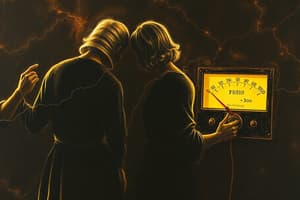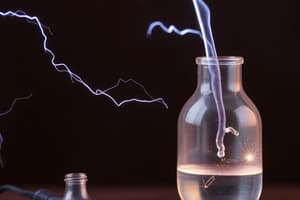Podcast
Questions and Answers
Which of the following is an example of a strong electrolyte?
Which of the following is an example of a strong electrolyte?
- Hydroxide
- Acetic acid
- Sodium chloride (correct)
- Carbonic acid
Weak electrolytes completely ionize in solution.
Weak electrolytes completely ionize in solution.
False (B)
What is the term for solutions that allow the passage of electric current?
What is the term for solutions that allow the passage of electric current?
Electrolytes
Pure _______ acid must be handled with extreme care.
Pure _______ acid must be handled with extreme care.
Match the following electrolytes with their classification:
Match the following electrolytes with their classification:
What did Alessandro Volta contribute to the study of energy conversion?
What did Alessandro Volta contribute to the study of energy conversion?
A non-electrolyte can conduct electricity in its solution.
A non-electrolyte can conduct electricity in its solution.
What are the two types of electrodes used in a voltaic cell?
What are the two types of electrodes used in a voltaic cell?
The scientist who began experiments on electricity passing through liquids is ______.
The scientist who began experiments on electricity passing through liquids is ______.
Match the following substances with their classification:
Match the following substances with their classification:
Flashcards
Non-electrolyte
Non-electrolyte
A substance that does not form ions when dissolved in a solution, preventing the flow of electric current.
Conversion of Chemical Energy into Electrical Energy
Conversion of Chemical Energy into Electrical Energy
The process of converting chemical energy stored within a cell into electrical energy.
Voltaic Cell
Voltaic Cell
An arrangement that generates electrical energy from chemical reactions using two metal electrodes (zinc and copper) dipped in a solution (like dilute sulphuric acid).
Electrolyte
Electrolyte
A liquid that conducts electricity due to the presence of ions, allowing electric current to flow through it.
Signup and view all the flashcards
Chemical Effects of Electric Current
Chemical Effects of Electric Current
The process where an electric current passing through a liquid (electrolyte) causes chemical changes. It is the reverse of generating electricity through chemical reactions.
Signup and view all the flashcards
Strong Electrolytes
Strong Electrolytes
Solutions or molten states of substances that conduct electricity very well because nearly all of the molecules break apart into ions, leading to high ion concentration.
Signup and view all the flashcards
Weak Electrolytes
Weak Electrolytes
Solutions or molten states of substances that conduct electricity poorly because only a small fraction of their molecules break apart into ions, leading to low ion concentration.
Signup and view all the flashcards
Ions
Ions
Charged particles (atoms or groups of atoms) formed when a molecule breaks apart into an electrolyte solution.
Signup and view all the flashcards
Ionization
Ionization
The process of a molecule breaking apart into ions when dissolved in a solvent or melted.
Signup and view all the flashcardsStudy Notes
Electric Current and Its Chemical Effects
- Materials that allow electricity to pass through them easily are called conductors. Metals are good conductors.
- Materials that do not allow electricity to pass through them easily are called insulators. Examples: Plastic, wood, bakelite.
- Some liquids also conduct electricity.
- Liquids made from salts/acids/bases break into free positive and negative ions, which allows the flow of current.
- Solutions of certain substances (salts, acids, alkalis) are good conductors, improving their conductivity.
- Distilled water does not conduct electricity, but solutions of certain salts/acids/alkalises do.
- The amount of ions in solutions affects their conductivity.
- Electrical current can have chemical effects (electrolysis).
- Substances like metals can be deposited on objects with electric current.
- Electroplating is the process of depositing a thin layer of one metal onto another.
- Electrorefining is the process of obtaining pure metals from impure ones through electrolysis.
- Electrolytic cells use electricity to drive chemical reactions.
- Electrolyte solutions conduct electricity.
- Some electrolytes conduct electricity better than others (strong vs weak).
- Electrolytes completely ionize when dissolved in water (strong), whereas weak electrolytes only partially ionize.
- Faraday's experiments discovered that a changing magnetic field can generate an electric current (electromagnetic induction).
- Using magnets and coils can create electricity.
Conductivity of Liquids
- Most solids are conductors. Liquids also conduct electricity, although not all do.
- Solutions of common salts (e.g., sodium chloride), acids, and alkalis are good conductors. Distilled water does not.
- Substances that conduct electricity in solution are called electrolytes.
Electrolytes
- Electrolytes are substances that conduct electricity when molten or dissolved in water.
- Strong electrolytes completely dissociate into ions in solution.
- Weak electrolytes partially dissociate into ions in solution.
Chemical Effects of Electric Current
- Electrolysis is the process where chemical changes occur when electric current passes through a liquid.
- The passage of current results in chemical changes (e.g., formation of bubbles, ions).
- Electrolysis is used in various applications like extraction of metals.
- Electroplating involves using electrolysis to coat a base metal with a thin layer of another metal.
Applications
- Electrolysis is used in the extraction of metals from ores (e.g., aluminium).
- Electroplating is used to improve the appearance, durability, or corrosion resistance of metal objects (e.g., coating bicycles, handles with chromium or nickel).
- Electroplating is applied in various products.
Studying That Suits You
Use AI to generate personalized quizzes and flashcards to suit your learning preferences.




